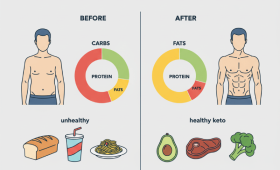The weight loss journey can turn into a battleground for many people. It starts with great motivation, but as weeks and even months pass, the numbers on the scale stubbornly refuse to change. At that moment, the question echoes in our minds: “Why can’t I lose weight?”. The answers to this question are often multifaceted and go beyond the cliché of “eat less, move more.” Understanding that the body is a complex system and that hormones, metabolism, stress, and even sleep quality play critical roles in this process is the first step toward success.
This guide was prepared for those struggling with weight loss who don’t know what to do. With 12 fundamental tips and 20 subheadings, each based on scientific data, it aims to offer you not just temporary solutions but a permanent and sustainable lifestyle change.
1. Rethink Your Nutrition
The most fundamental rule of weight loss is that the calories burned must be more than the calories consumed. However, the truths behind this simple equation contain details that many people overlook. What you eat, when you eat, and how you eat directly affect your weight loss success.
Recognize Emotional Eating
The stress, frustrations, or boredom of daily life can lead many people to emotional eating. When you find yourself in front of the refrigerator, question whether you are truly hungry. Perhaps your body is not feeling a physical hunger, but an emotional void. Recognizing this is the first step to stopping unnecessary calorie intake. Keeping a food journal to identify your emotional triggers can be very helpful in overcoming this habit.
Understand Macro and Micro Nutrients
Your body’s functioning is determined not only by calories but also by the balance of macro (protein, carbohydrates, fat) and micro (vitamins, minerals) nutrients. A high-protein diet can increase feelings of fullness, leading you to consume fewer calories, while complex carbohydrates and fiber regulate your digestive system. For example, the thermic effect of protein is higher than that of carbohydrates and fat. This means that more energy is spent during the digestion of protein. The dynamic specific effect of proteins is approximately 25%−30%, while that of carbohydrates is 5%−10% and fats is 2%−5%.
2. Drinking Water is Very Important
This seemingly simple habit is one of the most powerful weapons in the weight loss process. Water, which makes up more than 70% of the body, plays a vital role in many functions, from accelerating metabolism to aiding digestion.
Why is Water Indispensable?
Water accelerates metabolism, increasing calorie burning. Research shows that drinking water before meals increases feelings of fullness, causing you to consume fewer calories. Also, when your body is dehydrated, it can misinterpret hunger signals, causing you to eat when you are actually thirsty. Drinking at least 8−10 glasses of water a day is vital for both your metabolism and your overall health.
3. Set Realistic Goals
When starting the weight loss journey, many people set unrealistic goals, such as losing 10 kg in a month. When these goals are not met, motivation quickly disappears.
Achievable and Sustainable Goals
Break your goals into small, achievable steps. Losing 0.5−1 kg per week is a healthier goal that will also keep your motivation high. What is important is the small but determined steps you take on the way to your goal. For example, a simple goal like walking for 30 minutes every day can lead to big results in the long run.
4. Improve Your Sleep Quality
Although sleep may not be the first thing that comes to mind when it comes to weight loss, it plays a vital role in regulating metabolism and hormones.
The Relationship Between Sleep and Hormone Balance
Lack of sleep disrupts the balance of two important hormones in your body: leptin and ghrelin. Ghrelin is a hormone that increases feelings of hunger; leptin gives a feeling of fullness. When you don’t get enough sleep, ghrelin levels rise while leptin levels fall. This hormonal imbalance can cause you to eat more and gain weight. Getting at least 7−9 hours of quality sleep a day keeps these hormones in balance.
5. Learn Stress Management
The stress of modern life negatively affects not only your mental health but also your physical health and weight loss efforts.
The Relationship Between Stress and Cortisol
When you are stressed, your body secretes the hormone cortisol. Cortisol raises blood sugar, preparing your body for “fight or flight.” However, long-term high cortisol levels can lead to fat storage in the abdominal area. Simple stress management techniques like yoga, meditation, deep breathing exercises, or walking in nature can help lower cortisol levels.
6. Include Powerful Proteins and Healthy Fats
Consuming enough protein and healthy fats with every meal will keep you full for a long time and prevent unnecessary snacking.
Protein Provides Fullness
Protein is the slowest-digesting macronutrient. This means that when you eat a protein-rich meal, the digestive process takes longer, and therefore you feel full for a longer time. Sources like chicken, fish, legumes, and eggs are ideal for meeting your daily protein needs.
The Role of Healthy Fats
Healthy fats (like avocado, olive oil, nuts) are not only a source of energy for the body but also help with the absorption of vitamins and increase feelings of fullness. The digestion of fats is even slower than that of proteins, which prolongs the feeling of fullness. Remember, fats have the highest energy density at 9 calories per gram, so portion control is important.

7. Vary Your Exercise Routine
When it comes to weight loss, the first thing that comes to mind might be doing cardio. However, cardio alone may not give you the results you want in the long run.
Not Just Cardio
Cardio is a great way to burn calories, but you also need resistance training to build muscle mass. Muscle tissue burns more calories than fat tissue. Therefore, increasing your muscle mass allows you to burn more calories even at rest.
Combination of Workout Types
Add both cardio (running, swimming, cycling) and resistance training (weight lifting, bodyweight exercises) to your exercise routine. Also, varying your exercises prevents your body from getting used to one type of exercise and keeps your metabolism constantly active. For example, high-intensity interval training (HIIT) provides maximum calorie burning in a short time.
8. Consume Enough Fiber
Fiber not only ensures your digestive system works regularly but also contributes greatly to your weight loss process.
The Effect of Fiber on Digestion and Fullness
Fiber-rich foods (fruits, vegetables, whole grains, legumes) expand in your stomach, increasing feelings of fullness and slowing down the digestive process. This helps your blood sugar stay more stable and prevents sudden hunger pangs. Setting your daily fiber intake goal at 25−30 grams will help you get the most out of these benefits.
9. Prepare Your Own Food
Eating out or consuming processed foods usually contains more calories, salt, and unhealthy fats.
The Advantages of Meal Prep
When you prepare your own food, you can control everything in your meal. This allows you to practice portion control, use healthy ingredients, and avoid unnecessary additives. Planning your meals weekly and preparing food in advance reduces the likelihood of making unhealthy choices on busy days.
10. Review Your Social Circle
The weight loss journey is not just an individual effort. The people around you can be either your biggest supporters or your biggest obstacles in reaching your goals.
Create a Supportive Environment
Share your weight loss goals with your family and friends. Spend time with people who motivate you and have adopted a healthy lifestyle. You can exercise together, try healthy recipes, and support each other. The positive influence of your environment will help you maintain your motivation.
11. Be Patient and Be Kind to Yourself
The weight loss process is a journey with ups and downs. It is quite normal not to reach your goal immediately or to take steps backward sometimes.
Show Self-Compassion
Everyone’s weight loss rate is different. Avoid comparing yourself to others and focus on your own progress. Focus on small successes: “I exercised 3 times this week” or “I prepared my own meal instead of eating out.” These small victories will keep your motivation high in the long run.
Understand Weight Fluctuations
The number you see on the scale can fluctuate throughout the day due to factors such as water retention, hormonal cycles, or the digestive process. Accept these fluctuations as natural and, instead of fixating on the scale, track your overall progress (fitting into your old clothes, feeling more energetic, etc.). An average person’s body weight can fluctuate between 1−2 kg throughout the day.
12. Get Professional Support
In some cases, there may be an underlying medical reason why you cannot lose weight despite all your efforts.
When to Consult a Specialist?
If you cannot lose weight or are experiencing unexpected weight gain despite all your healthy habits, it may be helpful to consult a doctor or a dietitian. Health problems such as thyroid disorders, insulin resistance, or hormonal imbalances can make the weight loss process difficult. Experts can diagnose these conditions and create a special plan for you.
Choose the Right Specialist
When consulting a specialist, be sure to choose someone who considers your lifestyle, habits, and health history rather than just giving you a diet list. A qualified dietitian or nutritionist will provide you with a science-based and sustainable roadmap to reach your goals.
In a Nutshell
The weight loss process is not just a diet or an exercise plan. It is a journey of learning to take good care of your body and mind, being patient, and loving yourself. Remember, the numbers on the scale are just an indicator; true success is hidden in the moments when you feel more energetic, healthier, and better.
Remember, every small step is a big step on the way to your goal. Start today, not tomorrow.



